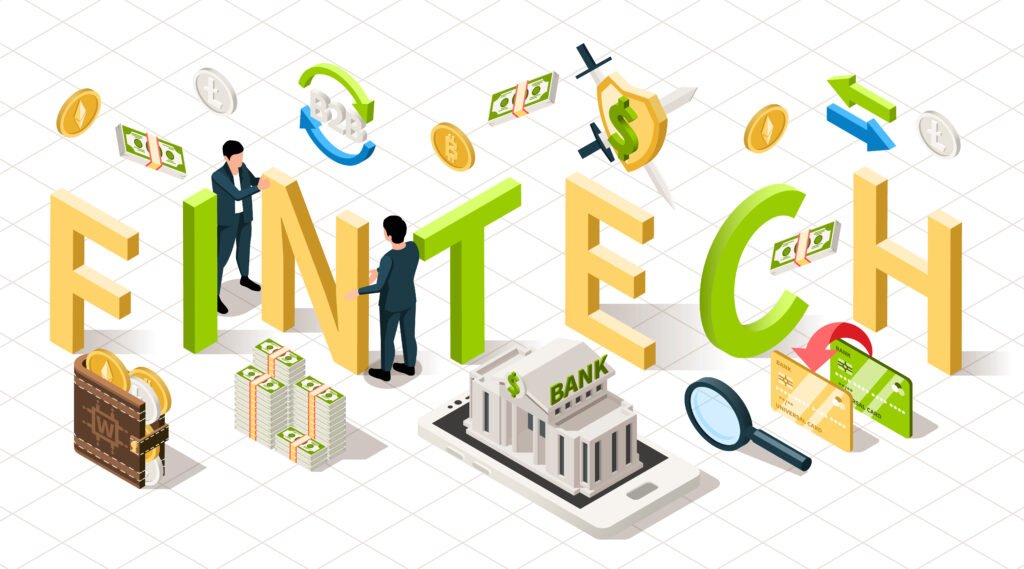Introduction to FinTech and it’s Impact in Pakistan
As technology continues to advance at an unprecedented pace, its impact on various industries is becoming increasingly evident. One sector that has experienced significant transformation is the financial industry, thanks to the rise of Fintech innovations.
Fintech innovations, short for financial technology, refers to the use of technology to deliver innovative financial services and solutions. In Pakistan, Fintech innovations has emerged as a key driver of economic growth, offering a range of benefits to both businesses and consumers. In recent years, Pakistan has witnessed a remarkable surge in the adoption of Fintech solutions, catalysing a profound shift in the financial landscape of the country.
This burgeoning sector has not only revolutionized traditional banking practices but has also paved the way for inclusive financial services accessible to a wider demographic. With the proliferation of mobile devices and internet connectivity, Fintech firms in Pakistan have seized the opportunity to democratize access to financial products and services, transcending geographical barriers and socioeconomic divides.
This democratization has not only empowered individuals with greater financial autonomy but has also powered entrepreneurship and economic development across various sectors of the economy.
The Current State of FinTech in Pakistan
Pakistan’s Fintech innovations landscape has witnessed remarkable growth in recent years. With a large unbanked population and limited access to traditional financial services, Fintech innovations has filled the gap by providing digital banking solutions, making financial services more accessible to the masses.
Mobile banking and digital wallets have gained widespread popularity, enabling users to make transactions, pay bills, and transfer money with ease. The government has also taken steps to promote Fintech innovations adoption, launching initiatives such as the National Financial Inclusion Strategy to encourage financial innovation and inclusion.
This surge in Fintech innovations adoption has not only addressed the longstanding issue of financial exclusion but has also catalyzed a broader digital transformation within the financial sector of Pakistan. Fintech startups and established entities are harnessing advanced technologies like artificial intelligence and blockchain to craft inventive solutions customized for the specific requirements of the Pakistani market.
For instance, AI-powered chatbots are being used to enhance customer service and streamline banking processes, while blockchain technology is being explored to improve the security and efficiency of transactions. These technological advancements are reshaping the way financial services are delivered and experienced, driving efficiency gains and enhancing the overall customer experience.
Furthermore, the rapid expansion of Fintech innovations in Pakistan has sparked a wave of entrepreneurship and investment, positioning the country as a hub for innovation in the financial technology space. Local and international investors are increasingly recognizing the potential of Pakistan’s Fintech ecosystem, pouring capital into startups and initiatives aimed at disrupting traditional banking models and unlocking new opportunities for growth.
This influx of investment is fueling the development of a vibrant Fintech ecosystem, characterized by collaboration between startups, financial institutions, regulatory bodies, and other stakeholders. As Pakistan continues on its Fintech innovations journey, the stage is set for further innovation, transformation, and socioeconomic impact in the years to come.

FinTech Innovation Trends in Pakistan
Pakistan’s Fintech ecosystem is evolving rapidly, with several key trends shaping the industry. One prominent trend is the increasing adoption of robo-advisory and automated investing platforms. These platforms leverage artificial intelligence and machine learning algorithms to provide personalized investment advice and automate investment processes.
By analyzing user preferences, risk tolerance, and market trends, robo-advisors offer tailored investment strategies, making wealth management more accessible to a broader audience. Moreover, the automation of investment processes streamlines portfolio management, reduces human error, and lowers operational costs for both investors and financial institutions.
Another notable trend is the emergence of peer-to-peer lending platforms, which connect borrowers directly with lenders, eliminating the need for traditional intermediaries. This not only provides greater access to credit but also offers attractive returns for lenders. Peer-to-peer lending platforms leverage technology to assess creditworthiness, facilitate loan disbursement, and manage repayment, creating a more efficient and transparent lending ecosystem.
Furthermore, these platforms promote financial inclusion by extending credit to underserved segments of the population, such as small businesses and individuals with limited credit history. By democratizing access to capital, peer-to-peer lending contributes to economic growth and empowerment at the grassroots level. The Fintech innovations landscape in Pakistan is witnessing a surge in digital payment solutions, driven by changing consumer preferences and the growing adoption of cashless transactions.
Mobile payment apps, QR code-based payment systems, and digital wallets are gaining traction as convenient and secure alternatives to cash. This shift towards digital payments not only enhances financial inclusion by providing unbanked individuals with access to formal financial services but also fosters efficiency in commercial transactions, reducing reliance on cash and mitigating associated risks such as theft and counterfeit currency.
As Fintech innovations continues to evolve in Pakistan, these trends are expected to reshape the financial industry, drive innovation, and unlock new opportunities for economic growth and prosperity.
The Top 10 FinTech Innovations in Pakistan
1. Digital Payments and Mobile Wallets
Digital payments and mobile wallets have revolutionized the way people transact in Pakistan. With the introduction of services like EasyPaisa and JazzCash, individuals can now make payments, transfer money, and even pay utility bills using their mobile phones. These platforms have made financial services more accessible to the unbanked population, promoting financial inclusion and driving economic growth.
2. Robo-Advisory and Automated Investing
Robo-advisory platforms have gained popularity in Pakistan, offering personalized investment advice and automated portfolio management. These platforms use algorithms to analyze market trends, risk profiles, and investment goals to provide tailored investment recommendations. By eliminating the need for human financial advisors, robo-advisory services are more cost-effective and accessible to a wider range of investors.
3. Peer-to-Peer Lending Platforms
Peer-to-peer lending platforms have disrupted the traditional lending landscape in Pakistan. These platforms connect borrowers directly with lenders, reducing the need for intermediaries such as banks. This not only makes borrowing more convenient and affordable for individuals but also provides an attractive investment opportunity for lenders, offering higher returns compared to traditional savings accounts.
4. Blockchain and Cryptocurrency Solutions
Blockchain technology has the potential to transform the financial industry in Pakistan. Its decentralized nature ensures transparency and security in transactions, making it an ideal solution for remittances, supply chain management, and identity verification. Additionally, the adoption of cryptocurrencies like Bitcoin and Ethereum can provide an alternative form of payment, reducing reliance on traditional banking systems.
5. Open Banking and API Integrations
Open banking initiatives are gaining traction in Pakistan, allowing customers to securely share their financial data with third-party providers. This enables the development of innovative financial services and applications that can improve the overall customer experience. API integrations facilitate seamless data sharing between different financial institutions, enabling customers to access a wide range of services from a single platform.
6. Insurtech Advancements
The insurance industry in Pakistan has also embraced Fintech innovations. Insurtech startups are leveraging technology to streamline insurance processes, enhance underwriting accuracy, and improve customer experience. With the use of AI and data analytics, insurers can now offer personalized insurance policies, assess risks more accurately, and expedite claims settlement.
7. Regtech and Compliance Solutions
With the increasing regulatory requirements in the financial industry, Regtech solutions have become essential for ensuring compliance. These solutions leverage technology to automate regulatory processes, monitor transactions, and detect fraudulent activities. By reducing manual intervention and improving efficiency, Regtech solutions enable financial institutions to comply with regulations while minimizing costs.
8. Fintech Incubators and Accelerators in Pakistan
To foster innovation in the Fintech space, several incubators and accelerators have been established in Pakistan. These organizations provide mentorship, funding, and networking opportunities to startups, enabling them to develop and scale their Fintech solutions. By nurturing entrepreneurship and facilitating collaboration, these incubators and accelerators play a vital role in driving Fintech innovations in the country.
9. Digital Identity Verification Solutions
Digital identity verification solutions are gaining traction in Pakistan, particularly in sectors like banking and e-commerce. These solutions utilize biometric authentication, facial recognition, and other advanced technologies to verify the identity of customers remotely, reducing the risk of fraud and enhancing security in digital transactions.
10. Sustainable Finance Initiatives
With growing awareness of environmental and social issues, sustainable finance initiatives are becoming increasingly relevant in Pakistan. Fintech startups and financial institutions are developing innovative products and services that promote responsible investing, green financing, and social impact investing. These initiatives not only align with global sustainability goals but also present new opportunities for investment and economic development in Pakistan.
Future Prospects and Challenges for FinTech in Pakistan
The future of Fintech innovations in Pakistan looks promising, with tremendous potential for growth. As the government continues to prioritize financial inclusion and digital transformation, Fintech startups are likely to thrive. Nevertheless, numerous hurdles must be tackled. One major obstacle is the lack of regulatory clarity and a supportive regulatory framework.
Clear regulations and guidelines are essential to build trust and ensure the stability and security of Fintech solutions. Additionally, addressing cybersecurity concerns and enhancing digital literacy among the population are crucial for the widespread adoption of Fintech innovations services.
Conclusion: The Potential of FinTech in Shaping Pakistan’s Economy
Fintech innovations have the power to reshape Pakistan’s economy by promoting financial inclusion, driving economic growth, and improving efficiency in the financial sector. With the increasing availability of digital banking services, mobile payment solutions, and innovative investment platforms, individuals and businesses in Pakistan have access to a wide range of financial services that were previously inaccessible.
Furthermore, the government’s commitment to fostering Fintech innovations through initiatives such as the National Financial Inclusion Strategy and the establishment of Fintech incubators and accelerators bodes well for the future of Fintech innovations in Pakistan. By harnessing the power of technology, Pakistan can unleash a future where financial services are more accessible, efficient, and inclusive for all.
Subscribe to our newsletter to receive future updates on Technology, Artificial Intelligence (AI), and Tech Trends. Explore our categories to find more relevant stuff. Stay informed and motivated with our most recent insights!



